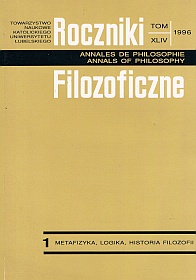M. K. Munitz's Attempt at the Philosophy of Existence
Abstract
The paper contains an analysis of the issue of existence on the grounds of the doctrine of Munitz, a contemporary American philosopher. According to Munitz, it is impossible to solve to question of existence (contrary to the proposals put forward by J.G. Frege, B. Russell or W.V.O. Quine) on the grounds of logic. It is necessary to take up philosophical considerations. In logic existence may only be defined as a semantic index, indicating that a given individual name (or proper noun) possesses a referent, actually existing in the world. It is impossible to formulate the problem of what existence is and whether it has any reason.
In philosophy, strictly speaking in ontology, existence may denote both realness (factuality, presence in the world) of concrete individuals and existence of the whole of world (the totality of all objects). From the fact, however, that existence is simple, final, absolute and without quality (without contents) does not follow that it is impossible to know its essence (what it is).
Moreover, according to Munitz man does not have any method which would allow him to answer the question whether the Existence of the Universe (all the objects) has or does not have any reason. The Universe simply Exists, yet we do not know whether its Existence is rational or irrational, contingent or non-contingent, having or not having reason etc. This means that philosophy, according to Munitz, while seeking to understand and explain the question of existence faces one of the most profound mysteries of the human mind. The only form to know Existence, available to man, is spontaneous, everyday, quasi-religious consciousness of that the Universe Exists.
Copyright (c) 1996 Roczniki Filozoficzne

This work is licensed under a Creative Commons Attribution-NonCommercial-NoDerivatives 4.0 International License.





